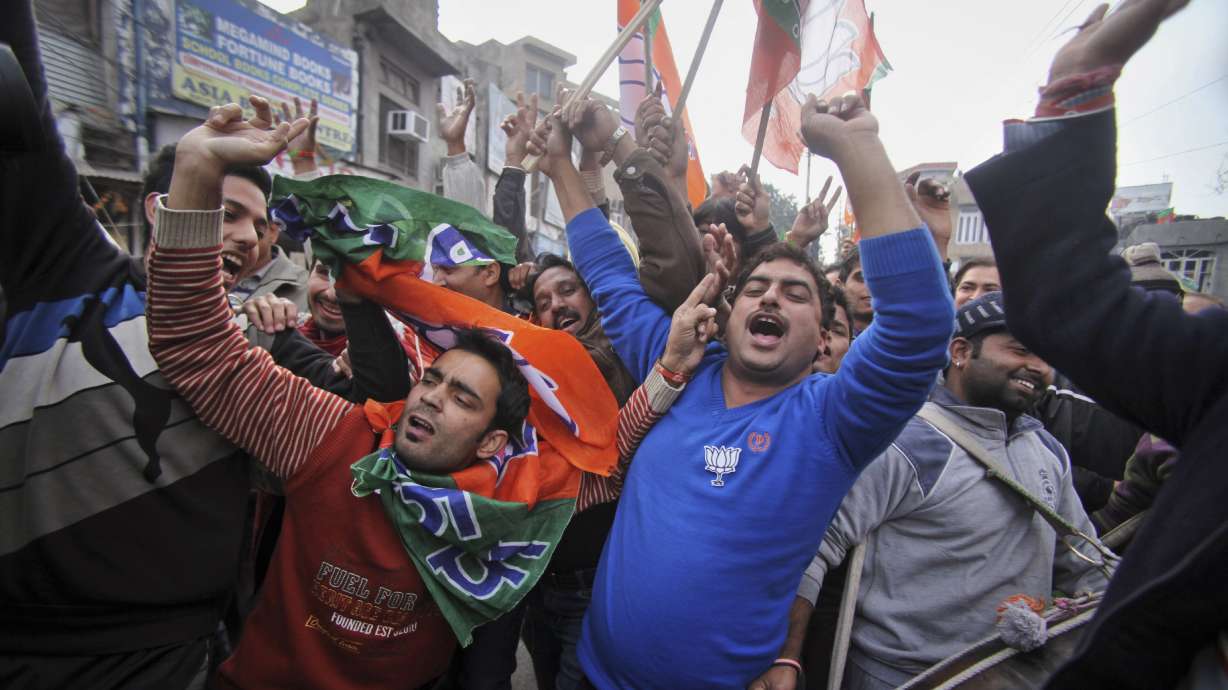Estimated read time: 3-4 minutes
This archived news story is available only for your personal, non-commercial use. Information in the story may be outdated or superseded by additional information. Reading or replaying the story in its archived form does not constitute a republication of the story.
SRINAGAR, India (AP) — India's ruling Hindu nationalist Bharatiya Janta Party emerged Tuesday as an important political player in the disputed Himalayan region of Kashmir, with vote counting in local elections showing that it made heavy gains in the regional legislature.
The party had led an ambitious campaign aiming for a majority in India's only Muslim-majority state, with Prime Minister Narendra Modi visiting and addressing rallies four times.
The BJP won 25 seats in the region's 87-strong state legislature, a significant jump from the 11 seats it currently holds. All the BJP's seats continued to be in the Hindu-dominated areas of the Jammu region in Jammu-Kashmir state, with the party failing to make inroads in the Muslim-majority Kashmir valley.
Experts said the results highlight the polarization of voters in the troubled region.
"The results show that the BJP's appeal has not gone beyond Hindu-dominated areas," said Noor Mohammed Baba, a political science professor at Kashmir University.
Kashmir is divided between India and Pakistan, but claimed by both in its entirety. The two rivals have fought two wars over Kashmir since they won independence from Britain in 1947.
The state's incumbent chief minister, Omar Abdullah, said the voting shouldn't be linked to the dispute over the region.
"This is not an election about India and Pakistan. It is not an election about the issue of Kashmir," Abdullah told reporters Monday, adding that residents had simply voted for whichever party they believed could solve their day-to-day problems.
The regional pro-India Peoples Democratic Party won 26 seats and was leading in two more, according to India's Election Commission.
With no party winning an outright 44 seats, it was unclear which combination of political parties would come together to form the state government.
Authorities say about 65 percent of nearly 5 million eligible voters cast ballots in the elections, which were held in five phases from Nov. 25 to Dec. 20 — a staggered process that allowed government forces to better guard against any violence or anti-India protests.
Anti-India sentiment runs deep in Kashmir, where rebel groups have been fighting since 1989, seeking independence from India or the merger of the region with neighboring Pakistan.
The BJP also looked likely to emerge as the largest party in the mineral-rich eastern state of Jharkhand. By late Tuesday afternoon, the party had won 31 of the state's 81 seats and was leading in seven others.
The final tally was expected to be clear by late Tuesday.
In earlier state elections held in October, the BJP won a majority in Haryana and took the most seats and formed a government in Maharashtra, where India's financial capital of Mumbai is located.
The BJP's gains in a string of state elections are seen as a confirmation of Prime Minister Modi's popularity and are likely to help him push through the economic reforms he has promised.
State elections decide who controls the upper house of India's Parliament. While the lower house is significantly more powerful, the upper house can delay legislation.
The BJP swept national elections in May and controls the lower house.
Copyright © The Associated Press. All rights reserved. This material may not be published, broadcast, rewritten or redistributed.








